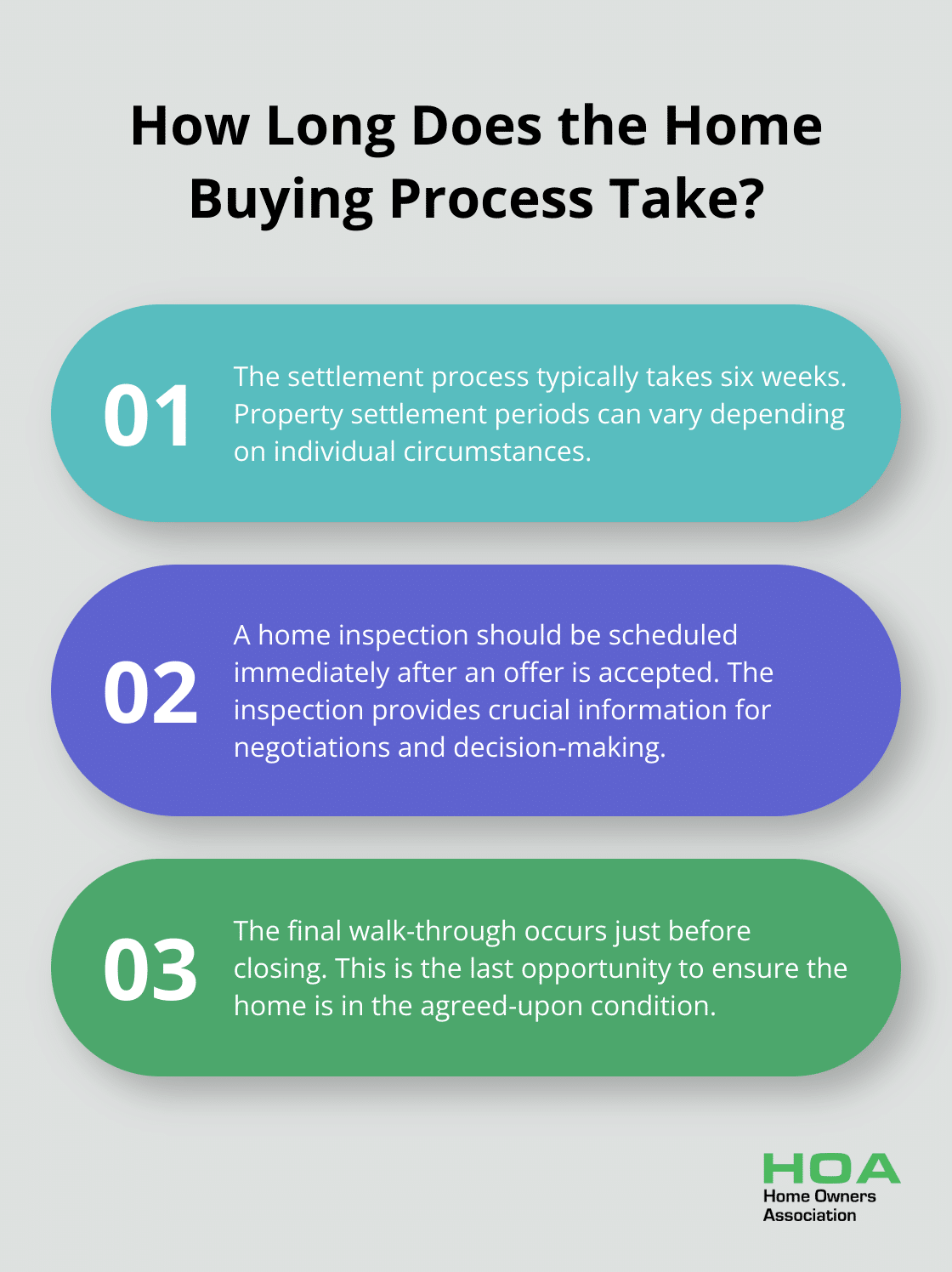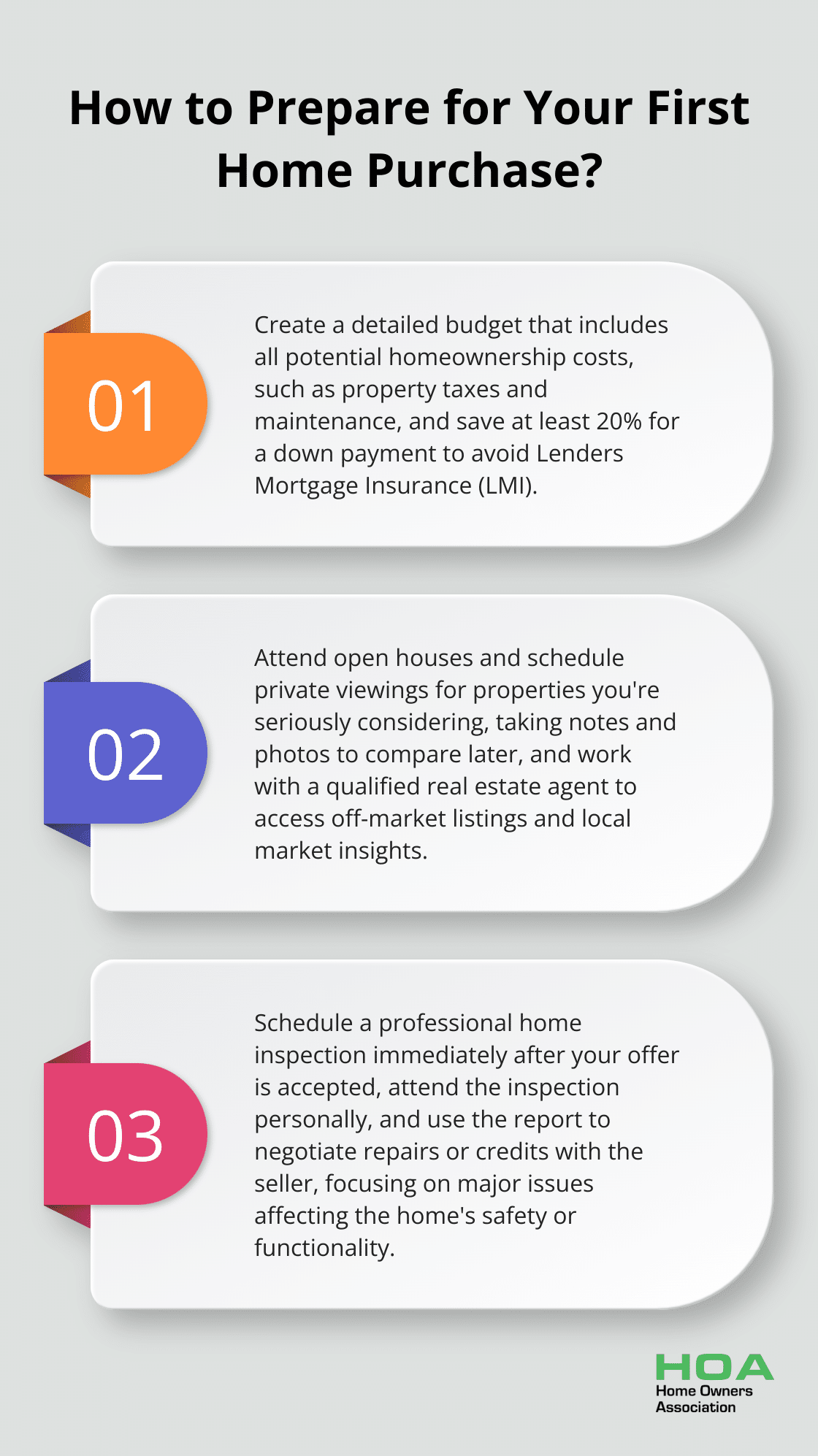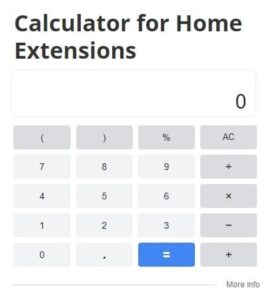
Buying your first home is an exciting milestone, but it can also be overwhelming. At Home Owners Association, we understand the challenges and complexities of this process.
Our comprehensive guide offers first-time home buying tips to help you navigate each step with confidence. From assessing your financial readiness to understanding the closing process, we’ll equip you with the knowledge you need for a successful home purchase.
Are You Financially Ready to Buy a Home?
Assess Your Financial Situation
Buying your first home requires a thorough evaluation of your finances. Take a close look at your monthly income and expenses to determine how much you can afford for mortgage payments. create a realistic budget that accounts for all expenses, including potential homeownership costs like property taxes and maintenance.
Boost Your Credit Score
Your credit score significantly impacts your ability to secure a mortgage with favorable terms. In Australia, lenders typically require a minimum credit score of 650-700 to qualify for a home loan. To improve your credit score, pay bills on time and reduce credit card balances. Avoid applying for new credit in the months leading up to your home purchase, as this can temporarily lower your score.
Build Your Down Payment
Most Australian lenders require a minimum deposit of 5% to 20% of the property’s value. Try to save at least 20% to avoid Lenders Mortgage Insurance (LMI) and secure better interest rates. To accelerate your savings, consider opening a high-yield savings account or utilize the First Home Super Saver Scheme (FHSSS), which allows you to make extra contributions to your superannuation to save on tax.
Obtain Mortgage Pre-Approval
Securing pre-approval for a mortgage is an essential step in the home-buying process. It provides a clear picture of your borrowing capacity and shows sellers that you’re a serious buyer. The Australian Securities and Investments Commission recommends obtaining pre-approval to streamline your property search and strengthen your position in negotiations.
Factor in Additional Costs
Don’t forget to account for expenses beyond the purchase price. The Australian Securities and Investments Commission suggests setting aside about 5% of the property’s value for associated fees and charges (including stamp duty, legal fees, and moving expenses). This preparation will help you avoid unexpected financial strain during the home-buying process.

A thorough assessment of your financial readiness will equip you with the confidence to navigate the home-buying journey successfully. The next step in your path to homeownership involves understanding how to effectively search for your ideal property.
Finding Your Dream Home
Create a Comprehensive Property Wishlist
Start your house hunt by listing your must-have features. Include the number of bedrooms, outdoor space, or proximity to public transport. Then, add your “nice-to-haves” – features you’d love but could compromise on. This list will guide your search and help you quickly eliminate unsuitable properties.
This step by step guide can help you understand what’s involved in the buying process, and identify potential red flags along the way.
Explore Potential Neighborhoods
Research is essential when you select a neighborhood. Investigate local amenities, crime rates, and future development plans. The Australian Bureau of Statistics provides valuable demographic data and growth trends for different suburbs. Use this information to identify areas that align with your lifestyle and investment goals.

Don’t limit yourself to online research. Spend time in potential neighborhoods at different times of day. This will give you a feel for the community and help you envision your life there.
Leverage Professional Expertise
While you can search alone, working with a qualified real estate agent can significantly streamline your search. They have access to off-market listings and insights into local market conditions that you might not find elsewhere.
Home buyers agents help clients avoid costly mistakes, negotiate better prices, and identify properties that meet their specific needs.
Attend Open Houses and Schedule Viewings
Open houses allow you to see multiple properties quickly and get a sense of the market without pressure. However, don’t rely solely on these events. Schedule private viewings for properties you’re seriously considering. This allows for a more thorough inspection and the chance to ask detailed questions.
Take notes and photos during viewings to help you compare properties later (it’s easy to forget details when you’re seeing multiple homes).
Make a Competitive Offer
Once you’ve found your ideal property, it’s time to make an offer. Research recent sales of similar properties in the area to understand fair market value. In competitive markets, prepare to make initial offers at or close to the listing price to attract sellers.
The lowest price isn’t always the best strategy. Consider the overall value of the property and its potential for appreciation.
With your dream home in sight, the next step is to navigate the complex closing process. This final stage requires attention to detail and careful consideration to ensure a smooth transition to homeownership.
Navigating the Final Steps to Homeownership
Home Inspection: A Critical Step
A thorough home inspection is essential. Professional inspectors uncover hidden issues that might cost you dearly in the future. A thorough home inspection saves you money in the long run by identifying potential issues and ensuring you make an informed decision. Don’t cut corners on this expense; it could save you thousands in future repairs.

Schedule the inspection immediately after your offer is accepted. Attend the inspection and ask questions. The inspector’s report will serve as a powerful tool for negotiations and help you make an informed decision about the property.
Negotiating Repairs and Credits
Use the inspection report to negotiate repairs or credits with the seller. Focus on major issues that affect the home’s safety or functionality. Minor cosmetic issues typically don’t warrant haggling.
If significant problems surface, you have several options:
- Ask the seller to make repairs before closing
- Request a credit to cover the cost of repairs
- Lower your offer price
Your real estate agent can guide you through this process and help you prioritize your requests.
Securing Your Mortgage
Lock in your mortgage rate and terms now. Provide all necessary documentation promptly to avoid delays. This often includes recent pay stubs, bank statements, and tax returns.
Prepare for additional requests from your lender. Respond quickly to keep the process moving. Avoid large purchases or job changes during this period, as it could affect your loan approval.
The settlement process typically takes six weeks, although the property settlement period can vary. During this time, your lender will conduct a property valuation to ensure the home’s value aligns with the loan amount. Maintain close contact with your lender throughout this period to address any issues that arise.
The Final Walk-Through
Conduct a final walk-through of the property just before closing. This is your last opportunity to ensure the home is in the condition agreed upon in the contract. Verify that any agreed-upon repairs have been completed and that no new issues have arisen since the inspection.
Bring your contract and inspection report to cross-reference any agreed-upon repairs or inclusions. Test all appliances, switches, and faucets. If you discover any problems during the walk-through, address them immediately with your real estate agent.
Closing the Deal
The closing process (also known as settlement) is the final step in your home-buying journey. This involves signing a multitude of legal documents and transferring funds. Try to review these documents in advance (if possible) to familiarize yourself with their contents.
On closing day, you’ll sign the final paperwork and receive the keys to your new home. Bring a government-issued ID and any required cashier’s checks or wire transfer confirmations. After signing, you’ll officially become a homeowner!
Final Thoughts
The journey to buy your first home involves excitement, challenges, and important decisions. You must assess your financial readiness, explore neighborhoods, and work with professionals who can guide you through the complexities of home buying. Our first-time home buying tips will help you make informed decisions and navigate the path to homeownership with confidence.

Homeownership creates a foundation for your future and connects you to a community. You will face numerous choices and potential obstacles along the way. However, patience and thorough research will serve as your allies throughout this process.
We at Home Owners Association dedicate ourselves to empowering homeowners in Melbourne, Australia. Our members receive access to trade pricing, discounts on construction and renovation materials, and personalized guidance (subject to terms and conditions). Welcome to the exciting world of homeownership!





